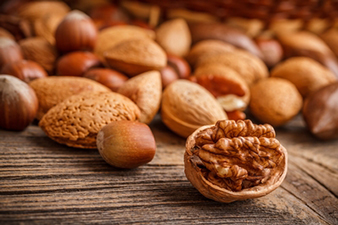We’re Going Nuts For This Food!

I travel a lot and am continually on the move. I never want to get so hungry that I am tempted to grab just anything, so I always stash a supply of nuts in my purse or briefcase. You really can’t go wrong with a snack of nuts. Yes, they are high in fat and calories, but nuts have healthful fats and are nutrient dense. That means they are loaded with protein, fiber, vitamins and minerals. Just one ounce of nuts delivers many important nutrients and the fat, protein and fiber they contain provide a feeling of satiety. Other good news about nuts is that according to a study published in The New England Journal of Medicine, eating about a handful of nuts a day is associated with a 20 percent lower risk of succumbing to disease.
The Mayo Clinic website states that besides being a good source of protein, most nuts contain at least some of these heart-healthy substances:
- Unsaturated fats. Many studies have indicated that the “good” fats in nuts — both monounsaturated and polyunsaturated fats — lower bad cholesterol (LDL) levels.
- Omega-3 fatty acids. Omega-3s are a healthy form of fatty acids that seem to protect the heart by preventing dangerous heart rhythms that can lead to heart attacks. Omega-3 fatty acids are also found in fish, but nuts are one of the best plant-based sources.
- Fiber. All nuts contain fiber, which helps lower cholesterol. Fiber provides a feeling of fullness, which helps prevent overeating. Fiber may also play a role in preventing diabetes.
- Vitamin E. Vitamin E may help stop the development of arterial plaques. Plaque development in the arteries can lead to coronary artery disease or a heart attack.
- Plant sterols. Some nuts contain plant sterols, a substance that can help lower cholesterol. Plant sterols are often added to products like margarine and orange juice for additional health benefits, but sterols occur naturally in nuts.
- L-arginine. Nuts are also a source of l-arginine, a substance that may contribute to making artery walls more flexible and less prone to blood clots.
All nuts have healthy nutrients in differing amounts and each one has different characteristics that appeal to individual tastes and applications. In his book, The 150 Healthiest Foods on Earth, author Jonny Bowden, PhD, C.N.S. includes a whole chapter on nuts and seeds. Some nuts he considers “Superstar Foods,” ones that even among super healthful, nutritious foods are standouts.
The first is almonds, which are among the oldest cultivated nuts in the world. Eating almonds in moderation can lead to lower body mass index or BMI while the fat and protein they contain make them a satisfying snack. At about 160 calories per ounce, almonds are one of the lowest calorie nuts. In addition, almond cell walls may partially limit the amount of dietary fat available, so it’s possible that a small portion of the calories from almonds are not absorbed. Almonds are rich in monounsaturated fat, which makes them heart-healthy. As part of a traditionally Mediterranean diet that’s high in fresh vegetables, fruits, fish and olive oil, almonds contribute to lowering levels of heart disease and cancer. Almonds are also a good choice for diabetics, as they contain 6 gm protein per ounce, 3 gm dietary fiber and no carbohydrates. They are also a good source of antioxidant vitamin E as well as important trace minerals including phosphorous and magnesium. Almonds are versatile ingredients in any meal from appetizers, to salads, entrees and desserts. Try my recipe for Almond-Blueberry Parfait.
They are also a good source of antioxidant vitamin E as well as important trace minerals including phosphorous and magnesium. Almonds are versatile ingredients in any meal from appetizers, to salads, entrees and desserts. Try my recipe for Almond-Blueberry Parfait.
Walnuts are another superstar nut. One reason is that they contain the highest amount of omega-3 fatty acids of any other nut. Omega-3 lowers triglycerides and reduces artery-blocking plaque formation. Walnuts support brain function and can boost mood according to Andrew Stoll, MD, a Harvard Medical School professor. The reason is that fats in the diet are incorporated into cell membranes. Omega-3s enhance our cells’ ability to communicate with each other and facilitate feel-good transmitters like dopamine and serotonin, which help support memory and brain function. Eating three to six halves before meals helps decrease hunger and prevent the temptation to overeat. Like all nuts, walnuts are nutrient dense, containing a good amount of fiber, protein, calcium, magnesium and the trace mineral manganese, which is beneficial for growth, reproduction, wound healing and proper metabolizing of sugars, insulin and cholesterol.  It’s easy to add walnuts to your diet because they are nutritious and tasty in a wide variety of recipes. With warmer weather approaching, my recipe for Spinach and Grapefruit Salad is a delicious, easy way to include walnuts’ age-defying antioxidants.
It’s easy to add walnuts to your diet because they are nutritious and tasty in a wide variety of recipes. With warmer weather approaching, my recipe for Spinach and Grapefruit Salad is a delicious, easy way to include walnuts’ age-defying antioxidants.
Brazil nuts have the highest levels of selenium of just about any food. Selenium is a trace element that tests have shown to provide protection from cancer. The Physicians’ Desk Reference (PDR) says selenium is, “Antioxidant, immunomodulatory, anti-carcinogenic,” which means it protects cells, boosts immunity, and helps fight cancer and heart disease. In addition, selenium helps the body to rid itself of toxic metals like cadmium and mercury. Selenium is difficult to obtain from plant and animal-based foods throughout most of the country.

Unless you’re eating foods grown in the high plains like the Dakotas and Nebraska that have volcanic soil, usually supplements are required to consume the levels that create benefit. Brazil nuts have a creamy texture and can be used in most any recipe calling for nuts. Try my luscious recipe for Brazil Nut Tarts for an unforgettable dessert.
While Cashews are higher in carbs than most nuts, they are lower in calories. Half the fat in cashews is monounsaturated, which lowers “bad” LDL cholesterol and raises HDL or “good” cholesterol. Cashews contain trace minerals including magnesium, calcium, phosphorous, potassium, copper, selenium. Add cashews to my recipe for Tofu and Vegetable Stir Fry. Just be sure to throw them in last so they don’t become too soft.
Hazelnuts (Filberts) contain potassium, a little magnesium, a little phosphorous, vitamin E and 3 gm of fiber while also being a good source of omega-3 fatty acids. Use about 1 quarter cup of crushed hazelnuts to add crunch and flavor to Savory Stuffing any time of the year.
